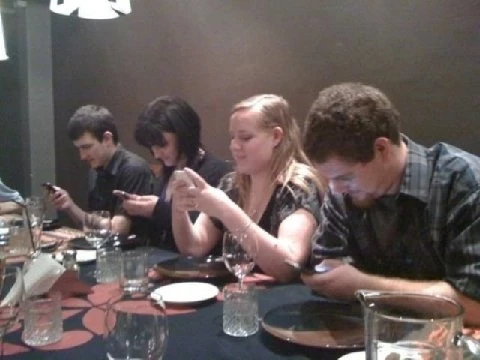Unrelenting
- Not yielding in strength, severity, or determination: “the heat was unrelenting”
- (of a person or their behaviour) Not giving way to kindness or compassion.
I am increasingly troubled by the endless expectations for perfection imposed upon people by their social environment. I perceive a long-standing trend of criticism permeating a wide range of our social and cultural influences. It has long been fed to us by advertising, entertainment, newspapers, television, books and radio. But with the growth of social media I am concerned by the impact of this voice entering the innermost circle of our social influences.
Before I write in detail about unrelenting standards and why their emergence in social media is troubling, let me give an example.
A coming social apocalypse?
Following are excerpts from a post I saw distributed on facebook some weeks ago – “These Photos are Proof Albert Einstein was Correct About Technology“:
… It looks as if Albert Einstein was right. Albert Einstein was fearful of the growth of technology and its effect on the human race. Here is Albert Einstein’s quote:
“I fear the day when the technology overlaps with our humanity. The world will only have a generation of idiots.”
Now keep that quote in mind and look at the photos below and tell us that Albert Einstein’s prophecy years ago hasn’t come true.
This was followed by a series of photos. The photo below, of a group of friends at a restaurant, summarises the series:

Just some insightful social commentary, perhaps? But then come the comments on the article. Here are just a few:
the facebook phenomena has created an opening for the ego to strenghten it’s grip on the spirit of human essence. It has allowed a self important, dull, and unimaginative personality to reach critical mass. Remember that when you feel the need to post what you’re watching this evening or what type of cookies you’re about to bake.
should be open season on any idiot walking anywhere in public with their face stareing down at a stupid phone … I do not think any of the idiots useing these have a life and their certainly not going to get one useing a stupid phone 24/7. NONE OF YOU ARE THAT IMPORTANT that you have to be avalible or contacting others as much as you doperiod.
We’re doomed.
Albert Einstein was on point…..Pure IDIOTS!
Actually the saddest is when a child is trying to get their parents attention, but the parent is “too busy” looking at their smartphone. It’s worse when they yell at their child to leave them alone while they stare at their phone. I’ve seen it too many times.
I”d rather be living back in the 1950’s. Does anyone have a time machine yet…?
Not all the comments reflect these sorts of attitudes. However, those I have selected show a concerning pattern of unhesitating condemnation of fellow human beings, and name-calling (the unrestrained use of the term “idiot”, also used in the quote falsely attributed to Einstein).
1950s utopia
As an aside, in the comments of the example I have chosen the 1950s was repeatedly cited as a perfect time to have lived. Perhaps we can take a closer look at this 1950s utopia to illustrate one of the absurdities of blanket criticism.
For a start, what might a group in a restaurant above have looked like in the ’50s?

(From Chuckman’s Chicago Nostalgia and Memorabilia)
Despite public campaigns warning of the dangers of smoking being already underway, people were still happy to subject their fellow diners to the toxic effects of their habit.
The social ills of the ’50s do not stop at the willingness in that decade to poison others (although that is also repeated in the next example). Consider the following quote from an article in a July 8, 1954 article in The Age newspaper, “Dust-reddened Redex Drivers Had Tough Journey to Mount Isa” (emphasis mine):
Gifts for Blacks
The crew of car 202 … will appease any panic-stricken aborigine tribesmen they find with gifts. They have packed hand mirrors, fans, scissors, lollies and cigarettes in the boot of their car.
One of the drivers, John Burton, 27, advertising manager, of Sydney, said:–We thought of the idea before we left Sydney and gathered up all the junk we could find at home.
The evidence is undeniable: clearly, men and women of the ’50s were all self-centred, toxic racists.
Of course, I jest. These are cherry-picked examples that prove no more about the ’50s than does a series of cherry-picked photographs prove anything about people today. The point I do want to make here is that every generation has its problems and the attitude with which we approach those problems has consequences.
The Unrelenting Standard
Dr Jeffrey Young, a psychologist who founded a variation of CBT known as “Schema Therapy” identifies a maladaptive structure of thinking (schema) that is developed in childhood which he has referred to as “unrelenting standards“. It is a pattern of thinking characterised by the adoption of excessively high standards in an attempt to avoid criticism. It manifests in perfectionism, rigid adherence to rules and being excessively critical of both others and the self. People with unrelenting standards simultaneously see themselves as unworthy and struggle to accept others. Their capacity for relaxation, pleasure, satisfying relationships or a sense of achievement is obstructed by these excessive standards.
One of the important aspects of unrelenting standards, I believe, is that they result in people being not only critical of others, but also critical of, and unsatisfied with, themselves. It is a lose-lose frame of mind.
Dr Young’s work examines how such structures of thinking form through early childhood experiences but then influence adult thinking and interaction with the world. Often the types of formative experiences involved in the development of such schemas are largely confined to the family and school environment. But I wonder about the pervasive influence on us all of hypercritical attitudes in media (think of attitudes expressed in current affairs programs, for example), combined with the incessant promotion of perfection in advertising (think of beauty product and cleaning product commercials and depictions of family’s and individuals’ lifestyles in all forms of advertising). It seems that these massages are then taken up and further promoted by a proportion of people – a fairly vocal proportion – in social media.
Hypercriticism in social media
As unrelenting standards begin to infiltrate our experience of social media – where the usual tempering effect of speaking face-to-face with our peers has been removed – I believe there is a potential for us all to begin to feel mounting pressure to be perfect. With this comes a growing fear that we won’t be acceptable to our peers if we are less than perfect.
I fear, for example, that the repeated naming of people who might look at their smart phone while in a restaurant as “idiots” may have a paradoxical effect – at least on some. A reader of such a post may, instead of putting away his phone and being more socially present, feel condemned and inclined to withdraw from his social interactions with peers.
There are a vast range of similar scenarios that come to mind:
A frustrated, struggling young mother who reads hypercritical articles or social commentary unreservedly condemning parents who smack their children as abusive may indeed abandon the use of smacking. Yet, lacking any offer of encouragement or support to implement positive strategies with her children she may find her frustration rises in lock-step with her sense of failure as a mother.
An alcoholic, desperately wanting to overcome his dependence on alcohol, may relentlessly castigate himself for one slip-up after several victorious months as the opinions of his peers on addicts as wilfully dependent play through his mind.
Two parents who have agonised over a decision not to immunise their children, after a family history of adverse reactions, may feel cut-off from the vital support of peers having seen black-and-white opinions expressed that those who do not immunise are recklessly endangering the lives of their own and other children.
As someone for whom criticism comes more naturally than compassion – knowing that too many times I have been the voice of criticism among my peers – I do not want any reader to feel condemned. (You know those “grammar Nazis”? I have to fight my instincts to be one, for one thing.) I would simply like to encourage consideration of what we all may be creating when we contribute to that voice, in the ears of our fellow human beings, demanding of them the impossible – demanding perfection.
The encouragement swap
The Australian Government has produced a lovely campaign for healthy lifestyle choices – “Swap it, Don’t Stop it“. Perhaps a similar concept can be applied here. Often, underneath criticism, there is a real concern for others: The peers of the frustrated mother want to see her and her children have a healthy, loving relationship; the peers of the alcoholic want to see him without a dependence on a substance; the peers of the parents who have not immunised want children to be safe from preventable diseases and disabilities.
What criticism and the demand for perfection can be swapped with is encouragement and support (if possible, practical support) towards improvement. Swap the “unrelenting” for “relenting”: “giving way to kindness and compassion”.

Leave a Reply